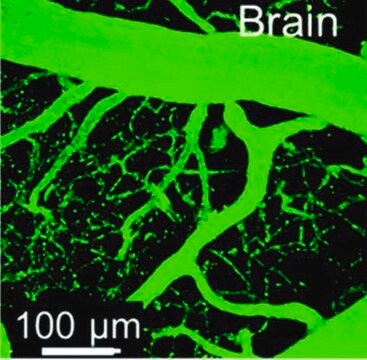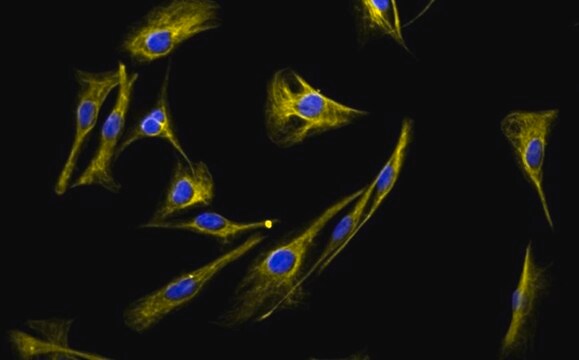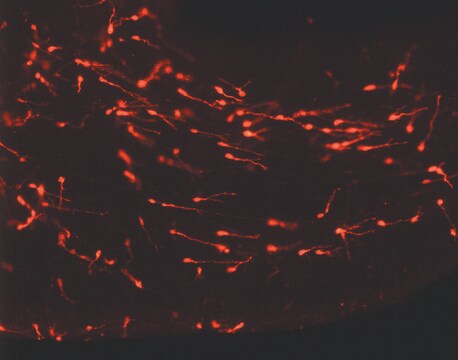Recommended Products
biological source
human
Quality Level
packaging
vial of >1X10⁶ cells
manufacturer/tradename
Millipore
growth mode
N/A
technique(s)
cell culture | mammalian: suitable
shipped in
liquid nitrogen
storage temp.
−196°C
Application
- Each vial contains > 1X106 viable cells.
- Cells are tested negative for infectious diseases by a Mouse/Rat Comprehensive CLEAR Panel by Charles River Animal Diagnostic Services.
- Cells are verified to be of rat origin and negative for inter-species contamination from mouse, human, chinese hamster, Golden Syrian hamster, and Non-human Primate (NHP) as assessed by a Contamination Clear panel by Charles River Animal Diagnostic Services
- Cells are negative for mycoplasma contamination.
Among adult organs, the liver has the unique ability to regenerate after injury, a feature that has generated a high level of interest in liver progenitor cells for therapeutic uses. Liver progenitor cells (also known as oval cells) have potential to differentiate into either of the two epithelial cell types in the liver, biliary epithelial cells or hepatocytes.1 The inherent versatility and clinical applicability of liver progenitor cells highlight the importance of cellular models for this cell type.
WB-F344 is a highly cited, spontaneously immortalized rat liver progenitor cell line. WB-F344 cells are derived from adult tissue yet have the characteristic phenotype of oval cells and proliferate rapidly.3 WB-F344 cells express markers of liver progenitor cells, including EpCAM, Thy1, and α-fetoprotein.3 WB-F344 cells are non-tumorigenic, but can undergo neoplastic transformation both in response to treatment with carcinogenic agents4 and spontaneously when maintained in a post-confluent state.5 The WB-F344 cell line is a well-established and versatile model for studies of liver cell renewal, differentiation, and origination of hepatic cancers.
Source
WB-F344 rat liver progenitor cell line was isolated from the liver epithelium of an adult Fischer-344 rat.2
References
1. Int J Exp Pathol 2005, 86(1): 1-18.
2. Stem Cells Cloning 2010, 3: 39-47.
3. Exp Cell Res 1984, 154(1): 38-52.
4. Am J Pathol 1989, 135(1): 63-71.
5. Am J Pathol 1998, 153(6): 1913-1921.
WB-F344 is a highly cited, spontaneously immortalized rat liver progenitor cell line. WB-F344 cells are derived from adult tissue yet have the characteristic phenotype of oval cells and proliferate rapidly.3 WB-F344 cells express markers of liver progenitor cells, including EpCAM, Thy1, and α-fetoprotein.3 WB-F344 cells are non-tumorigenic, but can undergo neoplastic transformation both in response to treatment with carcinogenic agents4 and spontaneously when maintained in a post-confluent state.5 The WB-F344 cell line is a well-established and versatile model for studies of liver cell renewal, differentiation, and origination of hepatic cancers.
Source
WB-F344 rat liver progenitor cell line was isolated from the liver epithelium of an adult Fischer-344 rat.2
References
1. Int J Exp Pathol 2005, 86(1): 1-18.
2. Stem Cells Cloning 2010, 3: 39-47.
3. Exp Cell Res 1984, 154(1): 38-52.
4. Am J Pathol 1989, 135(1): 63-71.
5. Am J Pathol 1998, 153(6): 1913-1921.
Features and Benefits
The WB-F344 cell line is a well-established and versatile model for studies of liver cell renewal, differentiation, and origination of hepatic cancers.
Storage and Stability
The cells should be stored in liquid nitrogen until use. The cells can be cultured for at least 10 passages after initial thawing without significantly affecting functionality.
Other Notes
This product is intended for sale and sold solely to academic institutions for internal academic research use per the terms of the “Academic Use Agreement” as detailed in the product documentation.
Disclaimer
Unless otherwise stated in our catalog or other company documentation accompanying the product(s), our products are intended for research use only and are not to be used for any other purpose, which includes but is not limited to, unauthorized commercial uses, in vitro diagnostic uses, ex vivo or in vivo therapeutic uses or any type of consumption or application to humans or animals.
Storage Class
12 - Non Combustible Liquids
wgk_germany
WGK 2
flash_point_f
Not applicable
flash_point_c
Not applicable
Certificates of Analysis (COA)
Search for Certificates of Analysis (COA) by entering the products Lot/Batch Number. Lot and Batch Numbers can be found on a product’s label following the words ‘Lot’ or ‘Batch’.
Already Own This Product?
Find documentation for the products that you have recently purchased in the Document Library.
Our team of scientists has experience in all areas of research including Life Science, Material Science, Chemical Synthesis, Chromatography, Analytical and many others.
Contact Technical Service




